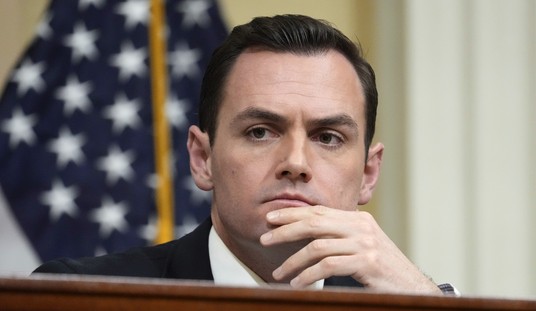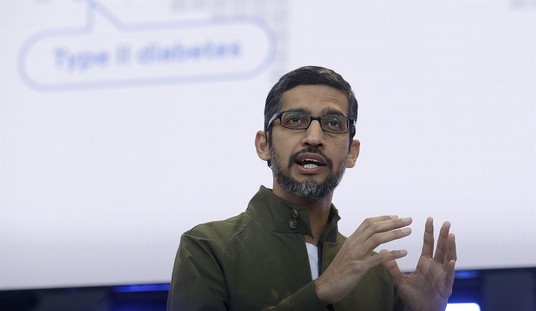I’m skeptical, but the degree of saber-rattling at the Herzliya Conference today was off the charts. First the IDF’s intel chief estimated that Iran has enough uranium to make four bombs, the first of which could be ready in a year. Later Ehud Barak claimed that Iran’s underground enrichment facility at Fordow would soon be too heavily fortified to destroy from the air using conventional weapons, which means the window to attack is closing. Then Israel’s vice prime minister warned that the Iranian missile base that was hit by that oh-so-mysterious explosion in November was working on solid-fuel ICBMs with a range of 6,000 miles, which would expand Iran’s target list from Israel and Europe to the U.S. Take it all together and you’ve got the Israeli brass warning America publicly that soon we’ll face the same nuclear threat as Israel unless someone acts imminently.
To which Panetta says: You go first.
Panetta believes there is strong likelihood that Israel will strike Iran in April, May or June — before Iran enters what Israelis described as a “zone of immunity” to commence building a nuclear bomb. Very soon, the Israelis fear, the Iranians will have enough enriched uranium in deep underground facilities to make a weapon — and only the U.S. could then stop them militarily…
Israeli Defense Minister Ehud Barak may have signaled the prospect of an Israeli attack soon when he asked last month to postpone a planned U.S.-Israel military exercise that would culminate in a live-fire phase in May. Barak apologized that Israel couldn’t devote the resources to the annual exercise this spring…
Israelis are said to believe that a military strike could be limited and contained. They would bomb the uranium-enrichment facility at Natanz and other targets; an attack on the buried enrichment facility at Qom would be harder from the air. Iranians would retaliate, but Israelis doubt the action would be an overwhelming barrage, with rockets from Hezbollah forces in Lebanon. One Israeli estimate is that the Jewish state might have to absorb 500 casualties…
“You stay to the side, and let us do it,” one Israel official is said to have advised the United States. A “short-war” scenario assumes five days or so of limited Israeli strikes, followed by a U.N.-brokered cease-fire. Israelis are said to recognize that damage to the nuclear program might be modest, requiring another strike in a few years.
Read PJM’s Barry Rubin and Red State’s Jeff Emanuel for smart, skeptical takes on attacking Iran. The bottom line now is the same as it’s been for the past five years: An attack wouldn’t finish off the program but would dramatically raise the risk of war in the region, including nuclear war once Iran puts its enrichment program back together. So why all the saber-rattling lately? Because the White House knows Israel is right about Iran nearing weaponization capabilities with uranium enrichment and they figure the threat of an Israeli attack might convince Iran to come back to the table and make a deal before that happens. Why they think that, I simply don’t know: The conventional wisdom about bombing Iran is that it would backfire by affronting Iranian citizens, who would end up rallying behind the leadership in national solidarity. Not too swift if regime change is your goal. In fact, some dovish analysts are convinced (of course) that even the new sanctions on Iran are backfiring by handing the mullahs an excuse for their miserable kleptocracy and mismanagement of the Iranian economy. Says Tony Karon at Time:
The escalation of an external threat also helps [Khamenei] reunite a dangerously divided regime (whose rival factions face off in a parliamentary election in March), creating a narrative that blames hostile Western pressure for the economic pain suffered by ordinary Iranians. It also fosters a siege environment in which political opposition is equated with treason. Even in the narrowest economic sense, talking up the possibility of confrontation helps Iran mitigate the effect of sanctions: The oil price seems to jump a few dollars with each new rattle of the saber.
And here’s Suzanne Maloney at Foreign Affairs arguing that it’s hard to negotiate with a regime that knows you’re trying to topple it.
What needs to be addressed is the disturbing reality that the Obama administration’s approach offers no viable endgame for dealing with Iran’s current leadership. The impression that the sanctions are permanent — indeed, the new law does not specify any conditions that Tehran might satisfy in order to lift the siege on its central bank — conforms to Iranian hard-liners’ darkest delusions about Washington’s intentions. By embracing maximalist measures, the White House has come full circle, abandoning, along the way, its earlier optimistic efforts at engagement. In doing so, it has implicitly relinquished the prospect of negotiating with the Islamic regime: given the ayatollahs’ innate mistrust of the West, they cannot be nudged into a constructive negotiating process by measures that exacerbate their vulnerability.
The White House doesn’t hide the fact that one of the goals of the new sanctions is to increase internal dissent in Iran with an eye to kickstarting an Iranian Spring. The implicit offer to Iran is that if they agree to outsource their uranium enrichment to other countries — which would, in theory, guarantee that it couldn’t reach weapons-grade — then the sanctions will be dropped. Iran has little incentive to accept that, though: They’d take a huge hit in prestige among the population by selling out their nuclear “energy” rights, and all they’d gain is a return to the economic status quo before sanctions were imposed. Whom do they blame then when their economy continues to tank? A more interesting offer would be if Obama promised to formally recognize the regime and restore diplomatic relations in return for them giving up on uranium. He won’t do that in an election year or else he’ll be bludgeoned politically for selling out democracy and appeasing an expansionist power, but I wonder about next year.
In any case, there’s a reason why Panetta’s focused on April and not anytime sooner. Iran’s parliamentary elections are set for March and that’s bound to bring to a head some of the reformists’ lingering grievances from the repressed Green Revolution of 2009. The U.S./Israeli hope here, obviously, is that the results will inspire Green Revolution II: Iranian Spring, which in turn will upend the regime, which in turn will solve the problem of Iran’s nuclear scimitar being wielded by fanatic Shiite fundamentalists by replacing them with a new regime of somewhat less fanatic Shiite fundamentalists. Baby steps, my friends.
Update: Like I say, this “threat” ain’t much of a threat. New from the WSJ:
Iran denied United Nations inspectors access to a suspected nuclear site, scientists and documents during a visit to Tehran this week, dimming already scant hopes for a breakthrough to end a standoff over Iran’s nuclear work, according to diplomats briefed on the International Atomic Energy Agency’s mission.
The IAEA said it will return a senior-level team to Iran later this month to try and build on three days of discussions that were held with senior Iranian officials, which ended Tuesday.








Join the conversation as a VIP Member